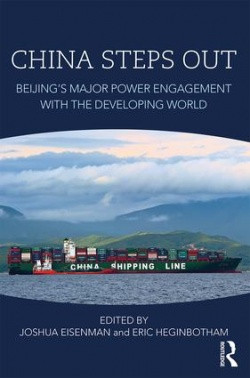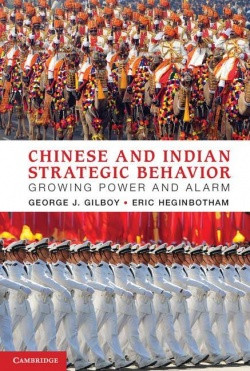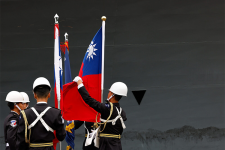Biography
Eric Heginbotham is a principal research scientist at MIT’s Security Studies Program and a specialist in Asian security issues. Additionally, he is the co-director of SSP's Wargaming Lab. Before joining MIT, he was a senior political scientist at the RAND Corporation, where he led research projects on China, Japan, and regional security issues. Prior to that he was a Senior Fellow of Asian Studies at the Council on Foreign Relations. After graduating from Swarthmore College, Heginbotham earned his PhD in political science from MIT. He is fluent in Chinese and Japanese, and was a Captain in the U.S. Army Reserve.
Heginbotham is a co-editor, China Steps Out: Beijing’s Major Power Engagement with the Developing World (Routledge, 2018), a co-author of Chinese and Indian Strategic Behavior, and was the lead author of China’s Evolving Nuclear Deterrent (RAND, 2017) and U.S.-China Military Scorecard (RAND, 2015). Heginbotham has published numerous articles in Foreign Affairs, International Security, Washington Quarterly and elsewhere. He is currently working on a book on Japanese military strategy.
Teaching
-
Simulating Global Dynamics and War
Selected Publications
Eric Heginbotham, "Estimating China’s Defense Spending: How To Get It Wrong (and Right)," Texas National Security Review, Vol. 7, No. 3 (Summer 2024) (M. Taylor Fravel and Eric Heginbotham)
Eric Heginbotham, "America Needs a Single Integrated Operational Plan for Economic Conflict With China," Lawfare, December 17, 2023 (With George J. Gilboy)
Eric Heginbotham, “Pushing on an Open Door: Japan’s Evolutionary Security Position,” The Washington Quarterly Vol. 46, No. 2 (Summer 2023) (With Samuel Leiter and Richard J. Samuels)
Eric Heginbotham, “Why We Believe the U.S. Still Has the Upper Hand in War Over Taiwan,” Newsweek, January 31, 2023
Eric Heginbotham, The First Battle of the Next War: Wargaming a Chinese Invasion of Taiwan, Center for Strategic and International Studies, January 2023 (With Mark F. Cancian and Matthew Cancian)
Eric Heginbotham, “Should the United States Pledge to Defend Taiwan?” Foreign Affairs, November 15, 2022
Eric Heginbotham, “Active Denial A Roadmap to a More Effective, Stabilizing, and Sustainable U.S. Defense Strategy in Asia,” Quincy Paper No. 8 (June 2022)
Eric Heginbotham, “Don’t Fall for the Invasion Panic,” Foreign Affairs, August 2021 (With Rachel Esplin Odell)
Eric Heginbotham, “China Maritime Report No. 14: Chinese Views of the Military Balance in the Western Pacific,” China Maritime Studies Institute, June 2021
Eric Heginbotham, “Vulnerable Alliances: U.S. Unpredictability and the Search for a ‘Plan B’ in South Korea and Japan,” Nonproliferation Policy Education Center (June 2020) (With Richard J. Samuels)
Eric Heginbotham, “China’s Relations with Africa, Latin America, and the Middle East,” in China and the World, in David Shambaugh, ed., China and the World (New York: Oxford University Press, 2020) (With Joshua Eisenman)
Eric Heginbotham, “Building a more ‘Democratic’ and ‘Multipolar’ World: China’s Strategic Engagement with Developing Countries,” The China Review Vol. 19, No. 4 (November 2019) (With Joshua Eisenman)
Eric Heginbotham, “Taiwan’s Balancing Act,” The National Interest, February 11, 2019 (With Rajan Menon)
Eric Heginbotham, "Japan’s View of Nuclear North Korea: What Could Possibly Go Wrong?” In William Overholt, ed., North Korea: Peace? Nuclear War? (Cambridge, MA: The Mossavar-Rahmani Center for Business and Government, Harvard University, 2019) (With Richard J. Samuels)
Eric Heginbotham, “Japan’s New NDPG and MTDP: An American Perspective on Operational Issues and Implications,” in James L. Schoff and Sayuri Romei, eds., The New National Defense Program Guidelines, April 2019
Eric Heginbotham, “Of Bombs and Bureaucrats: Internal Drivers of Nuclear Force Building in China and the United States,” Journal of Contemporary China Vol. 28, No. 118 (December 2018) (With Jacob Heim and Christopher P. Twomey)
Eric Heginbotham, “An Agenda for Japanese Military Reform,” East Asia Forum Quarterly, Vol. 10, No. 3, (September 2018) (With Richard J. Samuels)
Eric Heginbotham, "A New Military Strategy For Japan," Foreign Affairs, July 16, 2018
Eric Heginbotham, "Active Denial: Redesigning Japan's Response to China's Military Challenge," International Security, Vol. 42, No. 4 (Spring 2018) (With Richard J. Samuels)
Eric Heginbotham, Editor, China Steps Out: Beijing’s Power Engagement with the Developing World, (New York: Routledge, 2018) (With Joshua Eisenman)
Books
-

China Steps Out: Beijing's Major Power Engagement with the Developing World
Joshua Eisenman and Eric Heginbotham, Editors
Routledge, 2018
What are Beijing’s objectives towards the developing world and how they have evolved and been pursued over time? Featuring contributions by recognized experts, China Steps Out analyzes and explains China’s strategies in Southeast Asia, Central Asia, South Asia, Africa, Middle East, and Latin America, and evaluates their effectiveness. This book explains how other countries perceive and respond to China’s growing engagement and influence. Each chapter is informed by the functionally organized academic literature and addresses a uniform set of questions about Beijing’s strategy. Using a regional approach, the authors are able to make comparisons among regions based on their economic, political, military, and social characteristics, and consider the unique features of Chinese engagement in each region and the developing world as a whole. China Steps Out will be of great interest to students and scholars of Chinese foreign policy, comparative political economy, and international relations.
-

The U.S.-China Military Scorecard: Forces, Geography, and the Evolving Balance of Power, 1996–2017
Eric Heginbotham (lead author)
Over the past two decades, China's People's Liberation Army has transformed itself from a large but antiquated force into a capable, modern military. Its technology and operational proficiency still lag behind those of the United States, but it has rapidly narrowed the gap. Moreover, China enjoys the advantage of proximity in most plausible conflict scenarios, and geographical advantage would likely neutralize many U.S. military strengths. A sound understanding of regional military issues — including forces, geography, and the evolving balance of power — will be essential for establishing appropriate U.S. political and military policies in Asia. This RAND study analyzes the development of respective Chinese and U.S. military capabilities in ten categories of military operations across two scenarios, one centered on Taiwan and one on the Spratly Islands. The analysis is presented in ten scorecards that assess military capabilities as they have evolved over four snapshot years: 1996, 2003, 2010, and 2017. The results show that China is not close to catching up to the United States in terms of aggregate capabilities, but also that it does not need to catch up to challenge the United States on its immediate periphery. Furthermore, although China's ability to project power to more distant locations remains limited, its reach is growing, and in the future U.S. military dominance is likely to be challenged at greater distances from China's coast. To maintain robust defense and deterrence capabilities in an era of fiscal constraints, the United States will need to ensure that its own operational concepts, procurement, and diplomacy anticipate future developments in Chinese military capabilities.
-

Chinese and Indian Strategic Behavior: Growing Power and Alarm
Eric Heginbotham (with George Gilboy)
This book offers an empirical comparison of Chinese and Indian international strategic behavior. It is the first study of its kind, filling an important gap in the literature on rising Indian and Chinese power and American interests in Asia. The book creates a framework for the systematic and objective assessment of Chinese and Indian strategic behavior in four areas: (1) strategic culture; (2) foreign policy and use of force; (3) military modernization (including defense spending, military doctrine and force modernization); and (4) economic strategies (including international trade and energy competition). The utility of democratic peace theory in predicting Chinese and Indian behavior is also examined. The findings challenge many assumptions underpinning Western expectations of China and India.
Media
Quoted in "The battlegrounds that could decide a US-China war over Taiwan," Financial Times, Kathrin Hille and Demetri Sevastopulo, May 19, 2024.
Quoted in "China rebukes US deployment of missiles in Indo-Pacific," John Xie, VOA, April 19, 2024.
Quoted in "Assessing indigenous subs in Taiwan's defense strategy: Insights from U.S. experts," Sean Lin, Focus Taiwan, November 10, 2023.
Quoted in "Submarines Are Taiwan’s Best Defense Against A Chinese Invasion. The Island Democracy Is Building Eight New Ones." David Axe, Forbes, September 28, 2023.
Quoted in "Geopolitics in the gray area: how China is putting pressure on Taiwan as a chip location," Breaking Latest, April 29, 2023.
Quoted in "China drives for the biggest-ever nuclear weaponry development," Aniket Dixit, News Track, April 27, 2023.
Quoted in "China pushed largest-ever expansion of nuclear arsenal," France 24, April 26, 2023.
Quoted in "DC group's wargame predicts how China vs US war would end," Nathan Baca, Ruth Morton, and Becca Knier, WUSA9, March 20, 2023.
Quoted in "Crucial role: Defense of Taiwan hinges on Japan's support," Gabriel Dominguez, Japan Times, January 23, 2023.
Quoted in "Editorial: Ready or Not," Tobias Naegele, Air and Space Forces, January 20, 2023.
Quoted in "If China invades Taiwan: Bombers, Submarines And Missiles Dominate," Sebastien Roblin, 19FortyFive, January 15, 2023.
Quoted in "Taiwan would only last 3 months without US troops after China attacks: CSIS," Keoni Everington, Taiwan News, January 11, 2023.
Quoted in "Don't Expect A Lot of Aerial Dogfights If and When China Attacks Taiwan," David Axe, Forbes, January 11, 2023.
Quoted in "Taiwan and US Could Repel China's Invasion, but With Catastrophic Losses: Wargame," Andrew Thornebrooke, The Epoch Times, January 10, 2023.
Quoted in "The U.S. Fleet Could Lose Four Aircraft Carriers Defending Taiwan," David Axe, Forbes, January 10, 2023.
Quoted in "In wargame exercise, China fails to take Taiwan: US thinktank," France24, January 10, 2023.
Quoted in "The Week that Will Be," Katherine Pompilio, Lawfare, January 9, 2023.
Quoted in "3,600 American Cruise Missiles Versus the Chinese Fleet: How One U.S. Munition Could Decide Taiwan's Fate," David Axe, Forbes, January 9, 2023.
Quoted in "Report Launch - The First Battle of the Next War: Wagraming a Chinese Invasion of Taiwan," CSIS, January 9, 2023.
Quoted in "As Many as 10,000 Yanks Could Perish in Battle of Taiwan, War Game Suggests," C.M. VIK, The New York Sun, December 10, 2022.
Quoted in "If Yanks Hesitate in Battle of Taiwan - Even for a Week - We Lose," C.M. VIK, The New York Sun, December 9, 2022.
Podcast: "The U.S.-China Military Scorecard: Who's on Top?" Council on Foreign Relations, March 23, 2016.
Podcast: "United States and China: Trends in Military Competition," Briefing to Congress, October 5, 2015 (available on iTunes)
Recent News
-
Preventing Taiwan War: Is Strategic Ambiguity Still Working?
Eric Heginbotham | Quincy Institute for Responsible Statecraft (QI)
October 21, 2025
-
Lights Out? Wargaming a Chinese Blockade of Taiwan
Eric Heginbotham, Mark F. Cancian, and Matthew F. Cancian | Center for Strategic & International Studies(CSIS)
July 31, 2025
-
Wargaming Lab's Lin-Greenberg & Heginbotham hosts first UK Event at University of London Brunel
Joe Buchanunn |Brunel University of London
March 13, 2025
-
Podcast on Wargaming Nuclear Deterrence and Its Failures in a U.S.–China Conflict over Taiwan
Eric Heginbotham | Center for Strategic & International Studies (CSIS)
December 13, 2024
-
Fravel & Heginbotham: "U.S.-China Relations for the 2030s: Toward a Realistic Scenario for Coexistence"
Taylor Fravel & Eric Heginbotham | Carnegie Endowment for International Peace
October 17, 2024
-
America Needs a Single Integrated Operational Plan for Economic Conflict With China
Eric Heginbotham and George J. Gilboy | Lawfare
December 17, 2023








